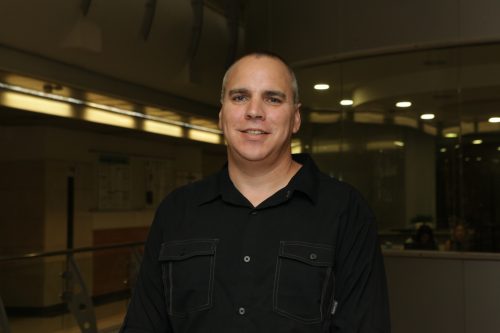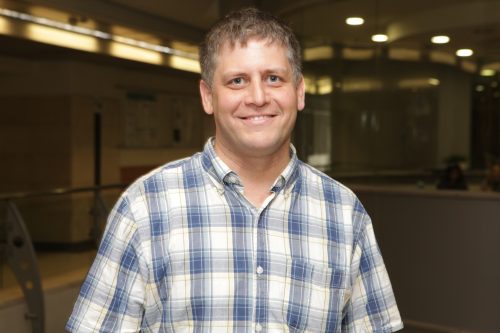The two's research is both in the field of heredity: changes in the genome during life and epigenetic effects of intestinal bacteria * The prize, in the amount of 200,000 euros each, is used to finance additional projects of young researchers in both countries. The ARCHES award was founded in 2008 by the German Ministry of Education and Research on the occasion of the Israeli-German Year of Science.

Two researchers from Bar-Ilan won the ARCHES award for the first time on behalf of the prestigious Manerva Foundation from Germany
On joint groundbreaking research with researchers from Germany
A delegation of the heads of the German Ministry of Science, including Deputy Minister of the German Ministry of Education and Science Mr. Thomas Rachel and the German Ambassador to Israel Mr. Clements van Goethe awarded the ARCHES award tonight: an excellence award for cooperation between researchers from Israel and Germany. The award was given by the Minerva Foundation in collaboration with the German Ministry of Science. This year the prize was awarded to researchers in the field of life sciences and medicine.
Thomas Rachel, Deputy Minister at the German Ministry of Education and Science awarded the ARCHES prize to two teams of young German-Israeli researchers. In his words at the ceremony, the German deputy minister praised the capacity for innovation inherent in the cooperation between Germany and Israel in the field of research: "The ARCHES award is an important element for building cooperation with Israel, whose wide variety and scope create a unique cooperation between countries. The joint research builds bridges between the people of the two countries. And this is done with cooperation at the highest level of excellence."
The prize, in the amount of 200,000 euros each, is used to finance additional projects of young researchers in both countries. The ARCHES award was founded in 2008 by the German Ministry of Education and Research on the occasion of the Israeli-German Year of Science.
The researchers who won this year are Prof. Erez Lebanon from the Faculty of Life Sciences at Bar Ilan University and Dr. Amri Koren from the Faculty of Medicine at Bar Ilan University. This is the first time that two researchers from the same university have won this award.
Prof. Erez Lebanon from the Faculty of Life Sciences at Bar Ilan University won an award for joint research with Vian-Philippe Jonker from the Max Delbrick Center for Molecular Medicine of the Helmholtz Society for their research "Genome-wide cartography of post transcriptional modifications in vertebrate brain development"

The research of Prof. Erez Lebanon and Jan-Philippe Jonker deals with the study of the genome, in ways that usually deviate from the traditional way of looking at genomic information. A central assumption in biology is that all the information required for the development and operation of a living creature is coded in DNA in a way that cannot be changed during its life, and that the same instructions are found in each of the creature's cells. An immediate derivative of this concept is the insight that any change in sequence is surely due to an error. Prof. Levanon explains "In contrast to this evidence, we mainly focus on natural mechanisms that are able to change the information encoded in DNA either directly by changing the genome, or on processes that are able to vary the sequence downstream of the information, when pieces of DNA are copied for the purpose of carrying out the instructions inherent in them. These processes are called "DNA editing" or "RNA editing, respectively" while evidence of the existence of these mechanisms existed for years, they were seen as esoteric or intended for the purpose of disrupting the genome software of attacking viruses and thereby neutralizing them.
Prof. Levanon adds, "The research in the field of Petah Zohar is not expected for a whole universe of complexity that is found throughout the animal kingdom and led to the discovery of new patterns in evolution. The most exciting discovery so far is the one we found recently and it is the RNA editing mechanism that is used by cancer to give its cells a survival advantage. This is how we revealed a world of mutations that were invisible until now. As part of the current research, we will deal with understanding the part of these processes in the creation of the complex structure of the brain. We will do this using a unique mapping technology that allows a huge amount of RNA molecules to be mapped to spatial coordinates in the brain. We plan to combine the knowledge of the two laboratories to build the first set of maps of brain development at the resolution of RNA modifications, to understand the role of creating the brain, which is the most sophisticated organ
Dr. Omri Koren from the Faculty of Medicine at Bar Ilan University won an award for joint research with Raffaele Taprino from the Helmholtz Institute for Experimental Genetics in Munich. The two's project is entitled "Some-to-germline information transfer and epigenetic inheritance: the role of the gut microbiota".
The research of Dr. Omri Koren and Raffaella Taprino deals with the role of the gut microbiome in epigenetic inheritance. This is a groundbreaking study that combines the two fields. This is the first time in the world that epigenetic inheritance is tested in sterile mice.
Dr. Koren explains the research "The purpose of the research is to test the relationship between two innovative fields in the world of science today - between the microbiome, the populations of bacteria living inside us, and inherited epigenetics - environmental effects on our DNA sequence that can be inherited to the next generation. In this study, we chose to examine the relationship between these two areas by an environmental factor that affects both - a diet rich in fats. Experience has shown that such a diet causes mice to gain weight, become obese and changes in the composition of intestinal bacteria. In addition, we hypothesize that a diet rich in fats causes epigenetic changes in the sperm and may even affect the structure of the testicles and the process of creating sperm cells. Therefore, in the planned experiments, the physiological effects caused to normal mice and sterile (bacteria-free) mice from a diet rich in fats will be examined first." Dr. Koren expects that there will be significant physiological changes in the mice following the dietary change, but these may be different among sterile mice, if the bacteria are indeed involved in the process. Later, we will examine whether a diet rich in fats causes epigenetic changes that are inherited, that is, whether the offspring of the mice that received a diet rich in fats show a unique physiology and whether this also happens in sterile mice," says Dr. Koren.
Prof. Aryeh Tsavan, Vice President for Research at Bar Ilan University, thanked the German delegation for the award and congratulated Prof. Lebanon and Dr. Koren. "I was very excited when I realized that the two winning researchers from Bar Ilan University won an award from the prestigious Minerva Foundation. These are two groundbreaking researchers who humbly and with infinite diligence demonstrate what thinking outside the box is and the impressive results are evident accordingly" said Prof. Tsavan. He thanked the German government, the German Deputy Minister of Science Mr. Thomas Rachel and the Minerva Foundation for awarding this year's prize to two researchers from Bar Ilan University. "Bar Ilan University is happy and proud of the fruitful collaboration with the German Ministry of Science and I hope that in the future we will see many more fruitful collaborations of this kind and even more. As vice president for research, I hope that researchers from Bar Ilan University will have more groundbreaking research such as the research of Prof. Lebanon and Dr. Koren."
